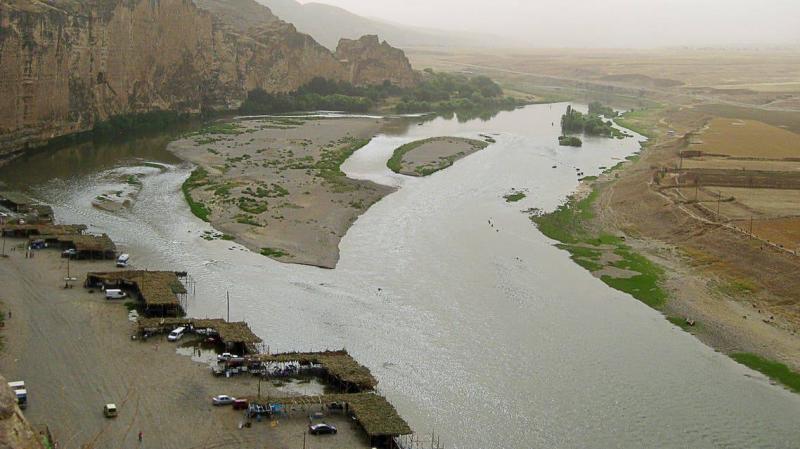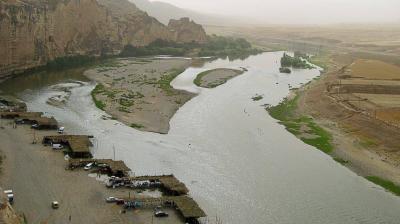Drought, darkness, and other issues threaten various regions in northern and northeastern Syria, most of which are under the control of the Syrian Democratic Forces, as well as some areas in Iraq. This situation has arisen due to Turkey's deliberate reduction of the water flow from its territories to these regions through the Euphrates River, which is referred to as "the great" by Iraqis. The drought and darkness are endangering the regions in both Iraq and Syria that rely on the river's water. Furthermore, Turkey's actions might lead to electricity shortages due to the presence of three dams in those Syrian areas, in addition to issues of thirst and the spread of epidemics, especially as the Euphrates has turned into merely a small stream, according to the latest images from the area.
Although Ankara officially acknowledges the reduction of water flow from 500 cubic meters per second to 200 cubic meters per second, officials in the "autonomous administration" confirmed that "the amount of the Euphrates water has decreased even more than the figures announced by the Turkish side." With the significant drop in the Euphrates water levels, residents of various northern and northeastern Syrian cities are seeking alternative solutions to the electricity problem, which has been cutting off for longer hours as more than one lake behind the three dams is on the verge of depleting its reserves.
### A Shadow of Darkness
The Syrian areas far from the dams located in Manbij, Raqqa, and Tabqa seem to be the most affected in terms of increased hours of electricity cuts. As a result, residents are seeking new means to obtain electricity, such as generators that provide a limited amount of electricity to subscribers for a monthly fee. Several residents of the towns of Hasakah and Qamishli stated to "Al Arabiya.net" that "the generators are not a good alternative to regular electricity, especially since the amount of electricity provided is not enough to operate all our household appliances, particularly with the onset of summer and the rising temperatures in our areas." The monthly subscription cost for the generators is 4,000 Syrian pounds (about 10 US dollars), under which subscribers get one amp of electricity for their homes.
Despite the fact that generators might become a new reality as Turkey continues to withhold Euphrates water in its dams, they are not available in all cities controlled by the Syrian Democratic Forces, such as Kobani (Ain al-Arab), Derek (Malikiya), Rumailan, and Raqqa, where generators are found in only a few neighborhoods. Sources in the dam administration revealed to "Al Arabiya.net" that "our institutions are trying to provide electricity to all areas controlled by the Syrian Democratic Forces by setting specific hours for each city. However, with Ankara's continued withholding of the Euphrates water, we may reach a point where we cannot generate electricity once the water reserves in the three lakes are exhausted."
### Irrigation Problems
The cutoff of Euphrates water by Turkey has caused not only electricity shortages but also a problem in securing water resources for irrigating crops, especially in areas near the riverbanks, such as the villages south of Kobani and those surrounding Raqqa and Deir ez-Zor. According to local sources, several farmers in those areas have lost their summer crop season due to more than three months of water shortages. This threatens food security in the areas controlled by the "autonomous administration," according to statements from some of its officials.
Despite the "autonomous administration" and the Syrian regime's appeals to international organizations, Ankara has not changed the amount of water flowing from its territories to Syria via the Euphrates. Turkey is also continuously cutting off drinking water to the entire Hasakah Governorate after a town housing a water pumping station came under its control following the last Turkish attack on the Syrian Democratic Forces in October 2019.
### Iraq's Situation
As for Iraq, it is witnessing a severe drop in water levels in the Tigris and Euphrates rivers as summer approaches, reaching unprecedented lows over recent years. Since 2003, Iraq has suffered from declining water levels in the Tigris and Euphrates rivers due to water policies adopted by Turkey and Iran, which involve reducing water release rates, altering tributary courses, and constructing large dams.
Iraqis fear the drought of the most important rivers running through their territory after vast areas of the Euphrates that flows through Syrian lands have become dry or semi-dry due to Turkey's reduction of water allocations to both countries. The river's water level has decreased by more than 5 meters for the first time in its history, especially in southern Iraq.
It is worth noting that Iraq primarily relies on the Tigris and Euphrates Rivers and their tributaries, all of which originate from Turkey and Iran, flowing from the far north and northeastern regions, converging at Shatt al-Arab in the south in Basra Governorate. The rivers also pass through Babil and Karbala, then Najaf and Diwaniya, followed by Al-Muthanna and Dhi Qar, before entering the marshes in the south of the country. In the south, the Tigris and Euphrates converge to form the Shatt al-Arab, which flows for 120 kilometers southward into the Arabian Gulf.
Commenting on the drought crisis, a source in the Iraqi Ministry of Water Resources explained that with the reduction in water flow to Syria from Turkey, Iraq's share is now at risk and the water percentage has become very low. He also pointed to the shrinking agricultural lands and the widening circle of desertification, in addition to the environmental changes resulting from this situation.




